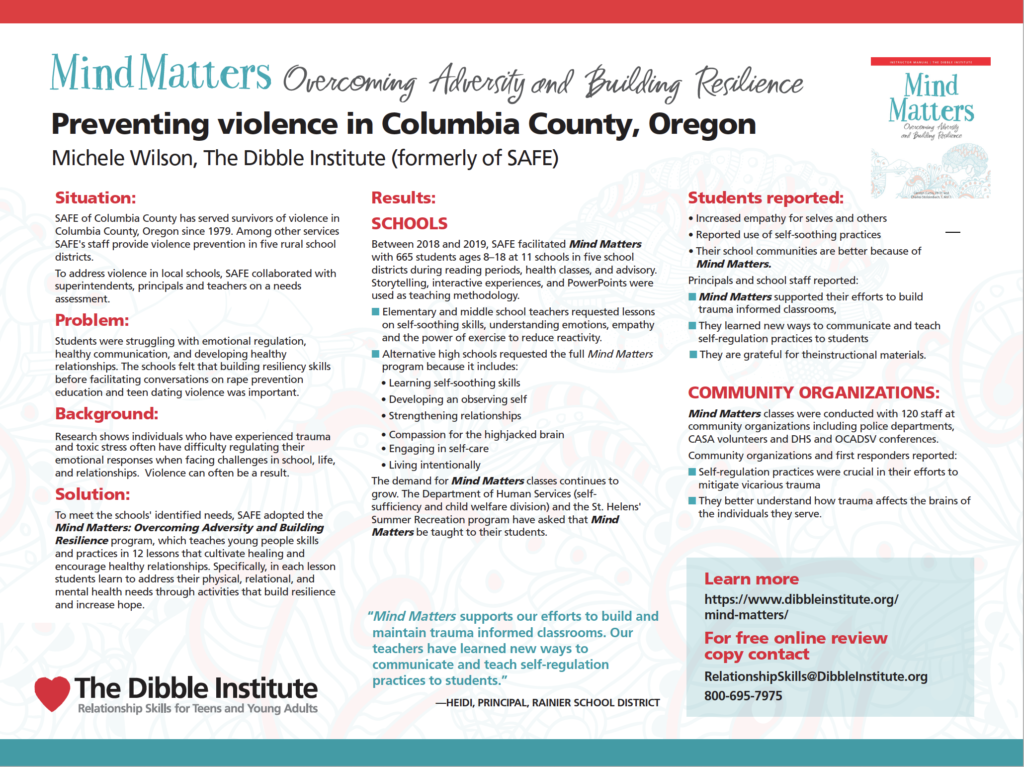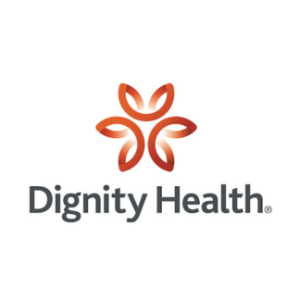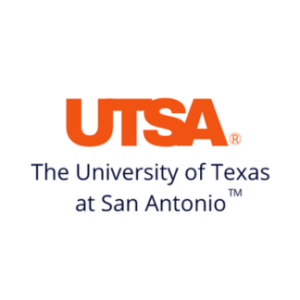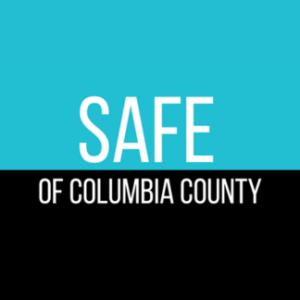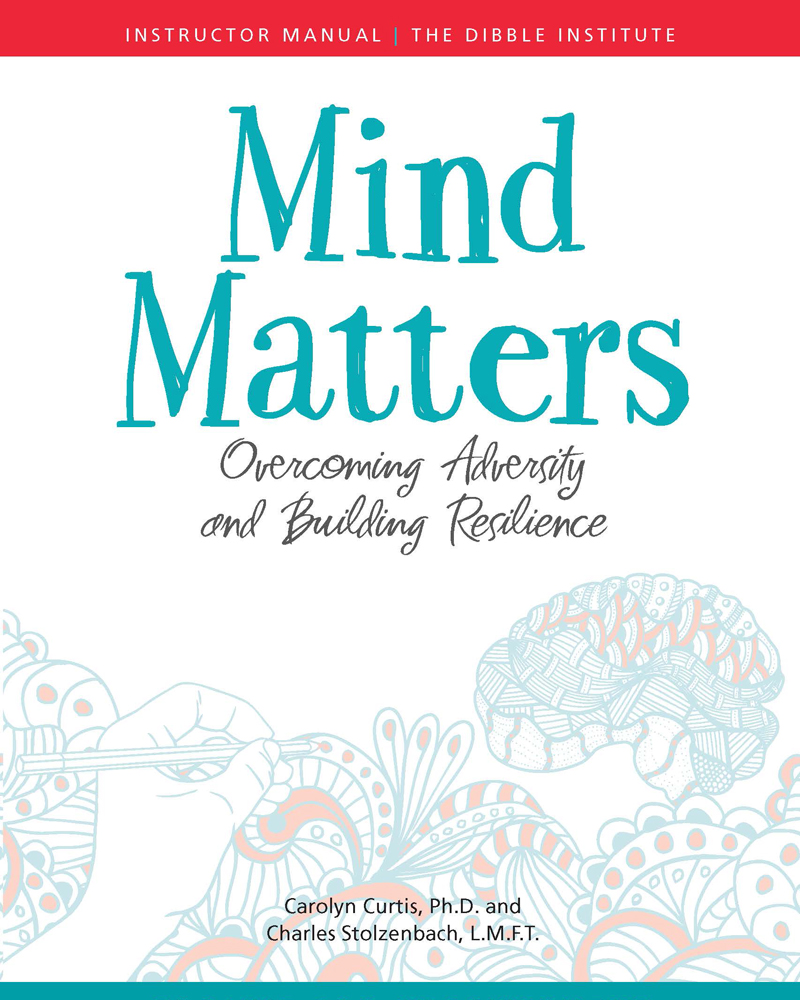
Program Length: 12 Lessons (1 hour each) or 21 Sessions (15-20 minutes each)
Age Group: 12+
Authors: Carolyn Curtis, Ph.D. & Charles Stolzenbach, L.M.F.T.
Overcoming Adversity and Building Resilience
People experiencing ongoing stress or prior trauma often have difficulty regulating their emotional responses when facing challenges in school and work, life and relationships. As participants learn the skills and strategies in Mind Matters, they can begin to take charge of themselves and their responses to what life throws at them. Participants learn to address their physical, relational, and mental health needs.
In addition, Mind Matters’ teaches individuals proven ways to deal with stressful, perhaps adverse, life experiences using innovative methods based on current research and neuroscience.
Mind Matters may be taught by non-clinicians in group or individual settings with adults or teens (12 and up) to build skills that help them cope with life’s stressors. The program can be successfully implemented in health classes, home visiting settings, career and technical ed programs, parenting classes, residential group homes, corrections, staff development seminars, and more.
Participant materials for Mind Matters have been translated into Spanish to better serve young people.
Note: Training is not required but encouraged to facilitate Mind Matters. Live virtual training is offered several times a year on a first come first serve basis. Group rates available for 6 or more people. Call 800-695-7975 or email relationshipskills@dibbleinstitute.org for more information.
Overview
The effects of childhood trauma and toxic stress are not easy to overcome. Formal training is often required for people to learn to notice and interrupt destructive thought patterns and harmful behaviors. Mind Matters teaches people skills and practices that cultivate healing and clear away distractions to learning and healthy relationships.
Mind Matters’ practical, hands-on lessons explore the effects of adversity and toxic stress along with the healing process. Each lesson, based on ACEs science, includes activities on increasing hope, overcoming adversity, and building resilience. The Appendix offers guidance to adapt each lesson for use in one-on-one settings, making the curriculum suitable for case workers, home visitors, mentors, and others working with individuals and families.
The lessons address the following topics:
- Self-Soothing and Regulating Emotions: Cultivate a mindfulness practice
- Managing Stress Effectively: Learn to reduce intrusive thoughts
- Developing Empathy: Improve interpersonal communications
- Creating a Code of Honor: Develop a life of intention
- Building and Using a Support System: Learn how to ask for help
The skills taught in Mind Matters are designed to be practiced over a lifetime. The curriculum is not meant to be therapy or to replace psychotherapy. Rather, it is intended to be facilitated by paraprofessionals to inspire, uplift, and set people on the journey of healing as they cultivate deeper resilience.
Mind Matters can be used to prevent violence, address chronic absenteeism, and build a culture of wellness.
Mind Matters: Overcoming Adversity and Building Resilience supports the healing process in young people who have experienced Adverse Childhood Experiences (ACEs) and other traumas. This research-based curriculum offers strategies to help teens and adults understand the effects of adversity and toxic stress, and teaches them skills to soothe and calm their mental and physical stress responses.
Mind Matters is an effective precursor or accompaniment to programs that build relationship skills and equip vulnerable youth for healthy futures because it helps clear away barriers to focus and learning. Young people who have experienced trauma often have difficulty regulating their emotional and verbal responses to common life situations and relationships. In 12 lessons, the course builds students’ resiliency by healing their brains, their health, and their lives.
Each lesson in the curriculum includes activities on increasing hope, overcoming adversity, and building resilience. These practical, hands-on activities and techniques can be implemented immediately, giving students tools to improve their lives starting with the very first lesson. The program also centers on practice. Students learn that “practice makes progress, not perfection,” and are given the space to progress at their own pace.
Mind Matters is flexibly designed to meet the needs of your program and your participants. The curriculum can be facilitated by para-professionals with simple practices that can be used in a variety of settings. Individual lessons and their accompanying activities are easily integrated into your existing programs as shorter time blocks or one-hour lessons.
Mind Matters focuses on six major goals:
- Utilize Self-Soothing Skills
- Develop an Observing Self
- Strengthen Relationships
- Compassion for the Hijacked Brain
- Practice Self-Care
- Live Intentionally
Self-regulation is the foundation of the program. As participants learn to pair existing negative thoughts with self-soothing skills, they begin to take charge of their lives and improve their states of mind. Through Mind Matters, students learn to address physical, relational, mental, and spiritual needs that are essential to increase their quality of life. They see that they are already the hero in their own life’s story.
The skills taught in Mind Matters are designed to be practiced over a lifetime. The curriculum is not meant to be group therapy or to replace psychotherapy. Rather, it is designed to inspire, uplift, and set young people on the journey of healing as they cultivate deeper resilience.
Lesson 1: Self-Soothing…………………………………………………………………….1
- Introduction to Mind Matters/Marshmallow Activity
- Four Self-Soothing Skills
Lesson 2: Discover Emotions……………………………………………………………15
- Body Scan
- Practice Identifying Emotions
- Emotions: When They Work and When They Don’t
Lesson 3: The Difference Between Emotion and Thought / The Internal Journal……..29
- Expressing Emotion or Thought
- Emotion or Thought Chart
- The Internal Journal
Lesson 4: Building Empathy……………………………………………………………..43
- Building Empathy
- Loving Kindness
Lesson 5: I Get By with a Little Help from My Friends/Wheel of Awareness….55
- Mapping Your Support System
- Wheel of Awareness
Lesson 6: Compassion for The Hijacked Brain………………………………………………………..67
- Introduction of Trauma and ACES Questionnaire
- Further Information on Trauma
- Effects of Trauma on the Brain and Behavior
- ACE Response Checklist
- HOPE: Methods to Build Your Brain
Lesson 7: Trauma Containment and Rhythm…………………………………………………………..83
- Trauma Containment
- Integrate the Senses through Rhythm
Lesson 8: Tapping / Efficient Sleep……………………………………………………………………………91
- Learn Tapping
- Efficient Sleep
Lesson 9: Let’s Get Moving………………………………………………………………………….101
- Let’s Get Moving
- Join a Team or Club/Self Defense
- Practice Yoga
- Exercise Plan
Lesson 10: Life of Intention………………………………………………………………………..111
- Your Road Map for Life
- SMARTER Goals
- Tell Someone
Lesson 11: Code of Honor / Asking for Help………………………………………………………..119
- Code of Honor/The Honor Shield
- Asking for Help
Lesson 12: The Ongoing Journey……………………………………………………………………………127
- Four New Skills
- Personal Agreement Contract
- Mind Matters Practice Record
- Safe Place, Picture, and Anchor Object
Bibliography…………………………………………………………137
Appendix: One-on-One Instruction………………………………………………..145
Frequently Asked Questions
Click on the questions below to expand the answers.
Why should I pay when I can get other programs for free?
Mind Matters is an effective, research-based psycho-educational program that has produced significant results in decreasing PTSD symptoms and increasing trauma coping skills. It can be easily implemented by teachers and other non-clinicians who want to help people deal with their trauma. The engaging and ready-to-teach lessons give facilitators the confidence to cover sensitive content in a caring way. It is ready to use with many audiences with little need for time-consuming alterations or adaptations.
How does Mind Matters address participant safety?
The authors of Mind Matters, Carolyn Curtis, Ph.D. and Charles Stolzenbach, L.M.F.T., have spent years working with people who experience stress in their lives and are experts in trauma. They wrote this program with the well-being of both participants and facilitators in mind. Mind Matters, based on the latest neuroscience research, has been successfully tested with diverse audiences.
From the beginning of the program, Mind Matters teaches self-soothing exercises to increase participants’ emotional regulation. These practices continue in every lesson to provide the participants with tools when addressing emotional topics.
The Mind Matters manual has everything needed to teach the program with confidence. Each lesson includes specific safety tips for facilitators to review prior to implementing the lesson.
Mind Matters training facilitated by a Dibble Institute Senior Trainer is encouraged to fully understand how each lesson is designed to be taught. The benefit of training also includes learning how to frame and safely process lesson content.
Remember:
- Mind Matters is a psychosocial education program, not therapy. Trauma (ACEs) is covered in general terms, including exploring the physiology of trauma and the impact of trauma on relationships, behavior, health, and learning. Participants do not discuss their personal trauma. Ultimately, the focus is on hope.
- The Participant Journal gives people an opportunity to practice the skills taught in Mind Matters in order to develop ongoing habits. The Participant Journal is not used to write about personal trauma.
- Many people find as they teach Mind Matters that they can utilize the skills for their own self-care.
I don’t need Mind Matters because we already use Mental Health First aid.
Mental Health First Aid is an awesome and valuable program. It’s a lot like going to the American Red Cross to take a CPR class: you could recognize the signs of someone having a heart attack if you saw it.
Mind Matters is different. It’s more like going to the gym to work out. It is a psycho-educational program that helps people develop the skills and habits to address and heal from toxic stress and trauma. The two programs work well together!
Is the program evidence based?
Mind Matters is based on current neuro-science and strong research-based practices. Outcomes of the program include significant increases in trauma coping skills, decreases in PTSD symptoms and positive changes in emotional regulation and social competence.
I only have 20 minutes a day. Can I use Mind Matters?
Yes! Mind Matters can be split into twenty-one 15 – 20 minute sessions. The guidance for doing so is in the appendix section.
Where is this program used? And who is it designed/written for?
Mind Matters is being used in middle, high, and alternative schools, in residential treatment facilities, and in correctional settings to name a few locations. It is written for anyone ages 12 through adulthood who have experienced trauma or stress. Anyone can benefit from the self-soothing skills, practices to support growth, and creating a plan to move forward.
Do I have to teach all of the lessons in order?
Mind Matters can be used very flexibly. While the skills, practices, and lesson content of Mind Matters build from lesson to lesson, the activities and lessons can be chosen to best fit the needs of your audience, your time constraints, and other circumstances. We have even seen it successfully used with young people in a residential setting who cycled into the lessons as they were admitted to the residence, not in any particular order.
What are the appropriate ages for Mind Matters?
All ages 12 and up.
How can Mind Matters be used in Multi-Tiered Systems of Support (MTSS) Tiers 1 and 2?
Mind Matters can be used by any teacher to create a safe place for students, teach self-soothing skills, and help their school to develop practices that build personal resilience. It can also be used by school staff to work with smaller groups of young people who need additional support.
How can Mind Matters be used to support Social and Emotional (SEL) Learning in schools?
Mind Matters content addresses many of the goals for SEL in schools including the five SEL competencies: self-awareness, self-management, social awareness, relationship skills, and responsible decision making.
Do I need to be a therapist to teach this program?
No, you do not need to be a therapist to teach this program. What is essential is being an effective teacher who can explain concepts, listen empathetically to the needs of students, and be supportive of their growth.
What materials are needed to teach Mind Matters?
You will need the Mind Matters Instructor’s Manual which includes all the lessons, self-soothing toolkit, handouts, plus access to the PowerPoint slides to download. Additionally, you will need the Journal for each participant. The Journal reinforces the content, includes the self-soothing skills instruction, and allows the participant to create regular plans to practice skills so they become habits.
Are there any support materials?
Yes! Teachers can access an online Facilitator Portal that includes the PowerPoint slides for each lesson, plus additional activities to go deeper into the content.
Do I need training in order to teach Mind Matters?
While training is not required, there are clear benefits for facilitators and organization staff attending a Mind Matters training. Questions may arise from participants about why they are learning certain practices or they may wonder why a practice works. Facilitator training provides an opportunity to understand the “how” and the “why.” The facilitator will see how the lessons and exercises are framed and modeled, and they will have an opportunity to practice with skilled trainers. All this allows for more confidence and competence when they do start teaching.
What is mental wellness?
According to the World Health Organization, mental wellness is defined as “a state of well-being in which the individual realizes his or her own abilities, can cope with the normal stresses of life, can work productively and fruitfully, and is able to make a contribution to his or her community.”
What is the difference between a Becoming Trauma-Informed program and Mind Matters?
A Trauma-Informed Program refers to changing the culture of an organization. For example, changing a culture might include changing processes and procedures or updating signage. Mind Matters instead focuses on helping an individual with previous trauma and toxic stress move towards healing.
The Mind Matters Curriculum plays an essential role in a trauma-informed organization. Mind Matters goes beyond knowing how to respond to a victim of trauma by laying out a plan of action for the victim to move towards healing. Topics include:
- Learning Self-soothing Skills,
- Developing an Observing Self,
- Building Supportive Relationships,
- Understanding and Compassion for the Hijacked Brain,
- Practicing Self-care, and
- Building a Life of intentionality.
What is the difference between Mind Matters, Mind Matters Now, Mind Matters Minutes, and Me & My Emotions?
Mind Matters is a 12-lesson out-of-the-box program ready to teach in school, community, or personal settings. It’s hands-on activities and content is meant to be facilitated by an adult in classroom, group, or one-on-one settings.
Mind Matters Now is available for an adult audience who is interested in learning the skills and practices of Mind Matters to benefit their own lives and as a professional development tool.
Mind Matters Minutes are a collection of 9 free, short videos to help you walk through self-soothing skills piece by piece.
We are excited to offer Me & My Emotions as a free digital experience website for teenagers! Learn the practices and skills from Mind Matters in a fun, game-like environment on the website. Watch videos, collect points and badges, and set plans to practice.

Carolyn Rich Curtis, Ph.D., a Licensed Marriage and Family Therapist, is the author of Mind Matters: Overcoming Adversity and Building Resilience.
She obtained her doctorate at the Professional School of Psychology, Masters from CSU, Sacramento and Bachelor’s Degree from UC, Davis. She founded he Relationship Skills Center in Sacramento that was recognized as one of the leading organizations in the nation in building healthy relationships. Dr. Curtis spoke at the White House regarding the success of the Center.
In her clinical practice, she specialized in working with couples, alcohol abuse and trauma. She was an adjunct faculty member in the Psychology Department of California State University, Sacramento and American River College teaching Child Development, Human Sexuality, Stress Management, Applied Psychological Principles and Introduction to Psychology.
Dr. Curtis is a Certified Clinical Trauma Professional. She presented papers at the Governor’s Conference on Child Abuse, the California Association of Marriage and Family Therapists, University of California Conference on Child Abuse and Neglect, Fathers and Families Coalition of America, and Office of Family Assistance Grantee Conference. She is currently very involved with community efforts to reduce the impact of trauma and with the First 5 Sacramento.
 Charles F Stolzenbach, L.M.F.T. is a Licensed Marriage & Family Therapist with over 40 years of clinical experience. Currently, he a Senior Mental Health Counselor with Sacramento County with the Department of Health and Human Services. For the past 18 years he has provided counseling services for the Temporary Assistance for Needy Families.
Charles F Stolzenbach, L.M.F.T. is a Licensed Marriage & Family Therapist with over 40 years of clinical experience. Currently, he a Senior Mental Health Counselor with Sacramento County with the Department of Health and Human Services. For the past 18 years he has provided counseling services for the Temporary Assistance for Needy Families.
He has degrees from Bluffton University, Garrett School of Theology at Northwestern University, and the University of California Irvine. Previous to this work, Stolzenbach was a Methodist Pastor for five churches and served as a Navy Chaplain during the Vietnam War.
During 30 years of experience in private practice, he specialized in couples, families, and individuals, alcohol abuse, and the effects of trauma on brain and bodily health. He was Director of the El Dorado Council of Alcoholism and founder of the Sierra Behavioral Health, Inc. He has clinical membership in the California Association of Marriage and Family Therapists, Certified Imago Therapist, and a member of the International Association of Trauma Professionals. He has certifications as Employee Assistance Professional, Imago Therapy, Group Psychotherapist, and Supervisor of Marriage and Family Therapists, and is an Instructor in Mastering the Mysteries of Love, PAIRS, Gottman Bringing Baby Home, and has training in Critical Stress Incidence Debriefing and EMDR Level II.
He now works with men and women to remove behavioral health barriers threatening their ability to successfully transition to the workforce and thrive as individuals. His work in part involves the use of behavioral health skills to reduce emotional distress and clear the way for productivity and personal fulfillment. His treatment perspective is comprehensive and focused addressing the factors impacting their ability to thrive in workplace environments, personal relations, and areas of personal health, well-being, and happiness.
Review the Mind Matters Underlying Evidence Base document here.
Rueda, H.A., Vera, A., Marcial, A. et al. (2023). A formative evaluation of “Mind Matters: Overcoming Adversity and Building Resiliency’ with Hispanic adolescents prior to and during Covid-19. Journal of Child & Adolescent Trauma. https://doi.org/10.1007/s40653-023-00585-3
Antle, B.F., et al. (2021). Mind Matters Comprehensive Evaluation Final Report. Findings from a randomized control trial conducted at the University of Louisville. Read the Full Report here.
Antle, B.F., and Cooper, S. (2020). Mind Matters Technical Report. Preliminary findings from an ongoing randomized control trial conducted at the University of Louisville.
WEBINAR: The Impact of Mind Matters: Results from the University of Louisville’s pilot Study. March 2020.
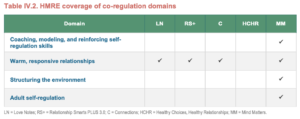
Positive Youth Development
Sex Education
Family and Consumer Sciences
CASEL Core Competencies
Mental Health in Rural New Mexico
New Mexico Extension Services are utilizing Mind Matters in their outreach to improve mental health and stress coping skills among farmers and ranches in rural New Mexico.
What Others Have to Say
“’Our hope is that, through implementing the Mind Matters curriculum, we will help students build resilience and develop coping mechanisms to overcome the obstacles they face.’ says Tansy Cattanach, program coordinator at Good Samaritan Community Services…Preliminary findings suggest that the groups provide a safe refuge for youth to share about their experiences and receive support. Youths are coming to class each week, motivated to learn about these topics, and are better able to notice stressors and use their own strengths to grow from emotional challenges they are experiencing.”
The University of Texas at San Antonio
“You probably haven’t heard of them. The Dibble Institute is a nonprofit agency that specializes in relationship training for youth. Their goal is to help young people build a foundation for healthy romantic relationships now, and for lasting, positive family environments in the future.
The Dibble Institute is currently offering a 12-Week curriculum, “Mind Matters Online Series” to help the viewer develop skills and coping mechanisms to overcome anxiety and build resilience. It is presented by Dr. Carolyn Curtis and Dixie Zittlow. The sessions are recorded, so being present live is not necessary. Be prepared to gain insight towards the self, laugh, and even dance in this series.”
Melinda Gonzalez
Dr. Vincent Felitti, co-principle investigator of the CDC-Kaiser Permanente Adverse Childhood Experiences Study (ACE Study), a groundbreaking research project that identified the link between childhood trauma and adult onset of chronic disease, violence, and being a victim of violence, once said that there weren’t enough therapists in the world to help people who suffer from the effects of childhood trauma.
He believed that people in the helping professions — teachers, clergy, emergency medical technicians, home visitors, youth workers, etc. — could be provided education and tools to help others heal.
Mind Matters: Overcoming Adversity and Building Resilience — A Toolkit for Empowerment is just that. It’s a well-written, well thought-out, and tested 12-hour course. It can stand alone or be integrated into other courses. It can be used with people of all ages–including teens, youth, and adults–in schools, community-based organizations, the justice system, foster care, shelters, and group homes. The instructors’ manual is a remarkably clear and concise guide.
Dr. Carolyn Curtis and Charles Stolzenbach have truly created a gift to the community of people looking for a way to help others learn about just how normal childhood adversity is, how profound its effects are on our brains, bodies, lives, and communities, and, most importantly, how to soothe and heal ourselves.
For that is where healing begins, within ourselves. From there we can continue to pay forward this new knowledge of human behavior and help people help themselves heal, with this toolkit tucked under our arms.
Jane Stevens, Founder, publisher, ACEs Connection Network
ACEsTooHigh.com/ ACEsConnection.com
Our community coalition is piloting this curriculum in a high school near us. We reviewed multiple curriculum options that addressed increasing emotional coping and resilience skills and felt this appeared to be the easiest to use for instructors from various backgrounds, was evidence informed (though we would love to see a stronger evidence base backing it, but we do believe in the work!), and encompassed most of the objectives we were looking for. It also was reasonably priced as well which is important when considering school budgets.
We are most driven by “doing the right thing” to work upstream of the chronic health issues and mounting costs of healthcare that are plaguing our system. Empowering patients and our communities with the tools to be healthy and well will serve us all better in the long run.
Natasha Ward, RDN, CD
This is a long-overdue curriculum. We’ve known for years that many of our students have experienced trauma and other adverse life events that compromise their ability to learn the social and cognitive skills needed for success in today’s world. Perhaps we imagined that we could do a work-around—that our curricula could be effective without attending to the central issues of adversity and resilience. Or maybe we assumed that other professionals or programs were taking care of those issues. Now that we have “Mind Matters,” a there is no excuse for this blind spot. With a blend of up-to-date teaching strategies and scientific understanding, along with good pacing and sensitivity to student privacy and boundaries, this curriculum will be welcomed in a wide range of settings. It’s the missing ingredient we’ve needed.
William J. Doherty, Ph.D.
Professor of family social science at the University of Minnesota. He has been a family educator and therapist for over 40 years.
As of this writing I have served as a licensed psychotherapist for more than 40 years. I have encountered numerous individuals whose lives have been seared by trauma. There are many types of trauma. The cause could be a sudden overwhelming explosion or repeated abuse. The resultant symptoms are consistent across cultures: hypersensitivity, intrusive memories, and social withdrawal. Trauma survivors are “burn” victims. They are raw. When a patient suffers a physical burn, the gentle healing procedures of a concerned physician cause pain because there is no protective insulation.
But, trauma survivors can learn from their ordeal. The Chinese concept for crisis is composed of two juxtaposed characters, danger and opportunity. Trauma can be a pathway for accessing resilience. But a map is needed.
Mind Matters: Overcoming Adversity and Building Resilience is a clear, comprehensive program that consists of experiences that can create resilience and stress inoculation. By following this path those who have suffered trauma can heal themselves in the places where they’ve been previously scorched. The skills that will be learned can have a proactive effect in building insulation — eliciting resilience in those who have not yet been subjected to stressful events.
The program outlined by Carolyn Curtis in Mind Matters should be instituted in schools and churches. It is remarkably engaging, well researched and well formulated path to creating resilience.
Jeffrey K Zeig PhD, Director, the Milton H Erickson Foundation
I had the pleasure of participating in the Mind Matters training the spring of 2016 through Lutheran Social Services the agency in which I am employed. We were able to learn techniques to enable us to better communicate with our friends, family and coworkers and to learn to respond in a more empathic manner.We also were able to discuss and actively demonstrate different calming techniques in order to help with anxiety and worry. My favorite technique was Tapping in which different pressure points were activated while using encouraging words. I continue to utilize tapping and have found it has definitely improved my anxiety at the work place.
Carolyn was an excellent educator, whom demonstrated with warmth and good humor her vast knowledge and experience regarding the human condition.
Thank you,
Tonia Sterpe MSW, CAS
Housing with Dignity
Program Coordinator
Lutheran Social Services
This workshop has impacted my life in a major way!!! I acquired tools to apply at my organization, for my staff to use, and most of all tools that I can utilize immediately to help me in the area of self care. This was a very valuable learning experience. I look forward to using the self-soothing techniques and to identify support systems. I will keep you posted.
Executive Director, Fatherhood Program
I truly needed this for my own personal growth and business growth. I see using this in many, many, ways.
Instructor, Relationship Education
Using Mind Matters for Multi-Tiered Systems of Support
Social and Emotional Learning (SEL)
The Elementary and Secondary School Emergency Relief (ESSER) Funds can be used to expand your mental health services and supports to address trauma and learning loss with students who have been affected by the COVID-19 pandemic. Mind Matters can not only expand your mental health supports and services in school, but also grow students’ understanding and growth in social and emotional learning. See how the program can be used as a Tier 1 and Tier 2 SEL support in classrooms, small groups, and one-on-one settings.
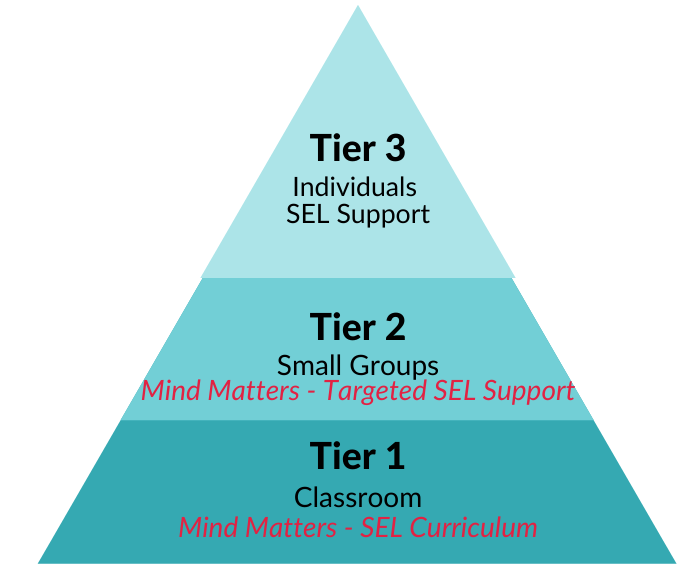
To make our materials accessible to young people of all learning abilities, the participant journals for this program have been included in the National Instructional
Materials Access Center (NIMAC) database.
- Arizona
- Avondale
- Phoenix
- Tuscon
- Arkansas
- Fayetteville
- Hot Springs
- Lakeview
- Rogers
- Wynne
- California
- Bishop
- Brea
- Cameron Park
- Chico
- Citrus Heights
- Commerce
- Concord
- Culver City
- Fresno
- Hayward
- La Puente
- Lancaster
- Long Beach
- Loomis
- Los Angeles
- Merced
- Mission Viejo
- Norwalk
- Oakland
- Orangevale
- Pasadena
- Plumas Lake
- Redding
- Rocklin
- Sacramento
- San Diego
- San Francisco
- Santa Monica
- Valley Village
- Venice
- Waterloo
- Watsonville
- Whittier
- Woodland
- Woodland Hills
- Colorado
- Colorado Springs
- Denver
- Florida
- Miami Gardens
- Pinellas Park
- Georgia
- Atlanta
- Monroe
- Idaho
- Boise
- Illinois
- Chicago
- Oakbrook Terrace
- Quincy
- Iowa
- Cedar Rapids
- Council Bluffs
- Des Moines
- Monona
- Kansas
- Garden City
- Manhattan
- Osborne
- Wichita
- Kentucky
- Louisville
- Owensboro
- Maine
- Milbridge
- Maryland
- Baltimore
- Bowie
- Massachusetts
- Dartmouth
- Michigan
- Fife Lake
- Grand Rapids
- Rockford
- Warren
- Minnesota
- Prior Lake
- Rochester
- Paul
- Thief River Falls
- Missouri
- Kirkwood
- James
- Montana
- Pablo
- Nebraska
- Moncton
- North Platte
- Nevada
- Elko
- New Jersey
- East Orange
- Summit
- New York
- Johnstown
- Schoharie
- North Carolina
- Greenville
- Raleigh
- Ohio
- Bellefontaine
- Cincinnati
- Columbus
- Vienna
- Oklahoma
- Oklahoma City
- Tulsa
- Oregon
- Portland
- Helens
- Pennsylvania
- Camp Hill
- Clearfield
- Meadville
- Philadelphia
- Phoenixville
- Pittsburgh
- West Chester
- South Carolina
- Greenville
- South Dakota
- Rapid City
- Tennessee
- Chattanooga
- Memphis
- Nashville
- Texas
- DeSoto
- Fort Worth
- Greenville
- Houston
- Kerrville
- Prairie View
- San Antonio
- Utah
- Loa
- Provo
- Salt Lake City
- Tooele
- Virginia
- Norfolk
- Washington
- Bremerton
- Granger
- Kirkland
- Ocean Shores
- Pasco
- Port Orchard
- Vancouver
- Yakima
- West Virginia
- Charleston
- Fairmont
- Huntington
- Wisconsin
- Baldwin
- Janesville
- Kenosha
- La Crosse
- Milwaukee
- Stevens Point
- Washburn
- Wyoming
- Cheyenne
- Cody
- Sheridan
- Northern Ireland


